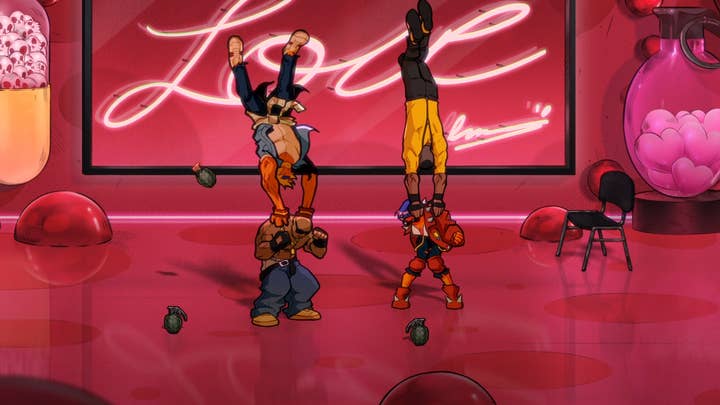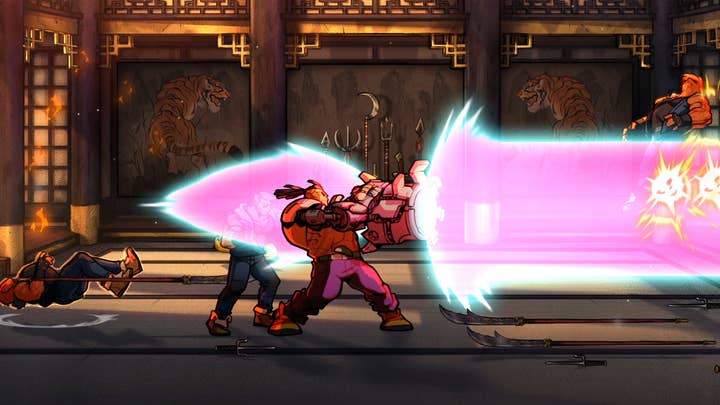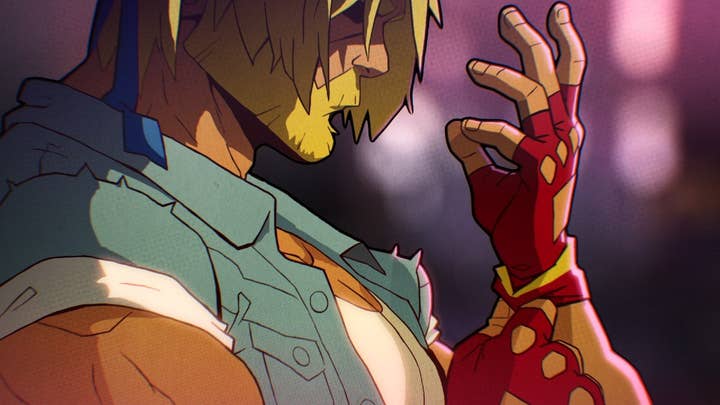Launching Streets of Rage 4 in the middle of a pandemic
Dotemu CEO Cyrille Imbert says production wasn't hurt by COVID-19, but the long-term and psychological effects are still unknown
Streets of Rage 4 was always going to be a high-pressure launch for Dotemu. After all, it had managed to secure the IP rights to one of the most beloved beat-em-ups from Sega, which came with high fan expectations.
But CEO Cyrille Imbert's team was ready. They had planned out everything -- production, marketing beats, all of it -- all the way up to launch, and so far, everything has gone smoothly. In spite of COVID-19 shutting down all in-person interactions for the foreseeable future right when Dotemu was gearing up for its launch -- which is next week -- Streets of Rage 4 is still, at least production and marketing-wise, on track.
Imbert tells me there are several reasons for this. One major reason is that the Dotemu team was already used to working from home due to a series of strikes in France late last year, which shut down almost all public transit. As a result, commutes got much, much longer -- Imbert himself had to travel two hours per day.
"People who don't usually play games are not going to play Streets of Rage right away. They'll just buy Call of Duty"
"In France, we all use public transport," Imbert says. "Nobody drives. People walk, or go by bike, but lots of people go by public transport. And during the strike there was no public transport at all, or very little.
"Many people couldn't spend that much time walking to work. So maybe more than half of the staff was already working from home, and the strike lasted very long -- more than a month. So we had to take measures during that time to work from home, and we got used to that for a whole month. And even before that, a couple of people in the office regularly [worked from home]."
As a result, Imbert was ready to make the call when French president Emmanuel Macron first advised people stay at home, but before it became a mandate. So Dotemu has been working from home since March 13.

In part because of the studio's previous experience working from home, Imbert says there was really no impact on the production of Streets of Rage 4. Communications and other remote systems were already in place, and all of the marketing was going to be digital. The only thing affected, he continues, was a physical press kit that the company had to cancel.
Then there's the fact that, in spite of the awfulness of COVID-19, much of the video game industry does stand to weather the situation well enough for the time being. Imbert tells me that while he's seen sales of video games, in general, going up due to everyone being stuck indoors, Dotemu isn't changing its internal sales projections for Streets of Rage 4.
"We can't tell what the future has in store... People are still playing games, but for how long?"
"People who don't usually play games are not going to play Streets of Rage right away," he says. "They'll just buy Call of Duty or something like that. I'm not sure it'll have an impact on indie, or niche, or retro games like we do. It could, but I think it will be the same or better, so we're not betting on it."
And event cancellations? Frustrating, but again, not a huge impact on business. "We're spending less money," Imbert says, adding that people are watching more streams and are online more, so they've just focused marketing there.
For a game launching right as the COVID-19 pandemic hits in full, Streets of Rage 4 has experienced minimal practical impact. Imbert concedes that Dotemu is lucky in that regard, though, because while the short-term impact is minimal, the long-term is something he can't predict.
"We are super lucky to work in this industry," Imbert says. "Me saying that this will probably not have any negative impact in the short-term on the video game industry in general and Dotemu, in particular, is crazy. But it's true.
"But we can't tell what the future has in store... People are still playing games, but for how long? At some point, people will -- and I really hope the government will handle this right and will do the right thing to help people, and I hope the economy will get back at some point. But I think it's going to be a very difficult situation.
"You get used to standing up in an open space and going to talk to someone... That's something you can't do while you're at home"
"So it might look good for now, for the video game industry, but I wouldn't bet in the future. In the future, people might have difficulty paying rent or having a normal life, so I don't think they will be buying video games anymore at that point."
None of this means Dotemu wasn't affected by the lockdowns at all. Imbert says there have been two major problems that the company has had to deal with since it began working entirely from home. The first, he says, is communication -- not the systems of it, which they already had in place, but the actual act of communicating with others.
"You get used to standing up in an open space and going to talk to someone and doing a quick meeting," he says. "That's something you can't do while you're at home, but we use a lot of tools to communicate. That could have implications. If you manage it well and make smart decisions for how to communicate, then at worst [a lockdown] might slow you down, but won't prevent you from doing what you want to do eventually."

The second concern is the psychological impact on his team, which is not only unpredictable but also something he doesn't yet have a concrete strategy to mitigate.
"I've been home, by myself, for 17 days with my dog," he says. "It's super weird. I'm a gamer, I won't get bored, but I get lonely sometimes. If this lasts for six months, I think things will be very hard, and that will translate into the relations we have with people at work. Sometimes when you're a bit stressed, you won't communicate the right way with people, so there might be more conflicts. There might be miscommunications. There might be frustration. This is definitely a threat to having people work in ideal conditions.
"Sometimes when you're a bit stressed, you won't communicate the right way with people, so there might be more conflicts"
"We have to adapt. The video gaming industry has always taught us to adapt very fast to any situation, so if it lasts that long, we'll have to completely change the way we communicate and approach planning, creativity, and all that kind of stuff."
For now, Imbert is trying different strategies to mitigate the psychological impact he knows is coming. He's setting up regular video meetings so the team has some human contact, and is also thinking of virtual team-building sessions where no one works, but instead does activities together like playing games. The goal is to keep people from feeling isolated and remind them they're on the same team.
"One of the threats for everyone, including the people working in the video game industry, is the psychological impact that all of this is going to have. You find yourself alone, at home, or with your family or whatever, and you start asking questions about what you're doing in life, the meaning of all this and everything. And I think it will have an impact.
"I'm not sure if it has already. For me, it hasn't, but I'm worried that people on my team are living in a different way. I'm not someone who is worried easily, but I know some people are. In a couple of days or a week I'll try to do something with the team to check in on them. Because I can see from a work perspective, everything is fine, there are no practical problems, but I'm not sure from a psychological perspective.
"I think I'm going to set something up to check on them. Because if you just say, 'Hey's what up?' They just go, "Yeah, I'm okay!' But it's different than actually talking about this."

